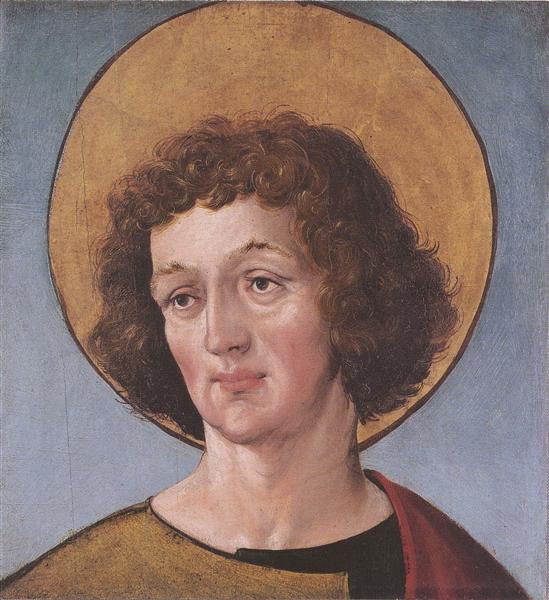Description
The painting "Head of a Male Saint" by Hans Holbein the Younger, dated 1516, represents a fascinating testimony to Renaissance art in the context of Northern Europe. Holbein, whose mastery of portrait painting is recognized and revered, achieves in this work a balance between realistic representation and spiritual devotion. The image of the saint, which occupies the center of the composition, allows the viewer to enter into an almost contemplative experience.
From the first glance, the work stands out for its remarkable attention to detail. The saint's head, with its serene and dignified expression, is treated with almost photographic precision. The meticulousness in the representation of the features – from the texture of the skin to the subtle play of light and shadow – reflects Holbein's technical skill. This ability is manifest not only in the saint's physiognomy, but also in the study of the hair, which appears as a three-dimensional element that frames his face, increasing the depth of the image.
The use of colour in this painting is equally significant. The palette is predominantly restrained and earthy, with brown and grey tones predominating, with hints of warmer colour subtly illuminating the skin. This choice of colours not only lends an atmosphere of seriousness, but also fosters an emotional connection with the viewer, inviting them to contemplate the grandeur of the painted sanctuary. The fantastical mix of light and dark is characteristic of Holbein’s style, who manages to create an atmosphere of introspection and spirituality through his mastery of chiaroscuro.
Despite the apparent simplicity of the work, Holbein invites reflection on the identity of the saint depicted. Although not conclusively identified, many interpretations suggest that it could be a portrait of a martyr or a saint known in the Christian tradition. This anonymous aspect adds an interesting dimension to the work, as the viewer is confronted with a symbol of devotion without being tied to a particular historical context. The universality of the saint evokes the idea of faith as a central axis in human experience.
Holbein's painting technique, marked by a virtuoso use of brushwork and an interest in the psychological representation of his subjects, can be seen in comparison with other works by the author, as well as with works by contemporaries such as Jan van Eyck and Hans Memling, who also fused religious devotion with meticulous detail. Holbein, however, stands out for his ability to capture not only the physicality but also the spiritual essence of his subjects, making him a bridge between Gothic art and the portrait renaissance in Northern Europe.
"Head of a Male Saint" is not only a masterpiece in its own right, but also serves as a window into the rich tradition of religious portraiture in the Renaissance. Its impact endures, inviting viewers to contemplate themes of faith, humanity, and the pursuit of the divine through artistic representation. Holbein's work reminds us of the profound connection that can exist between art and spirit, a legacy that continues to inspire and challenge generations of artists and art aficionados alike.
KUADROS ©, a famous painting on your wall.
Hand-made oil painting reproductions, with the quality of professional artists and the distinctive seal of KUADROS ©.
Painting reproduction service with satisfaction guarantee. If you are not completely satisfied with the replica of your painting, we will refund 100% of your money.

